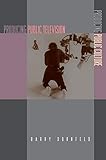Producing Public Television, Producing Public Culture / Barry Dornfeld.
Material type: TextPublisher: Princeton, NJ : Princeton University Press, [2022]Copyright date: ©1998Description: 1 online resource (250 p.) : 40 halftones 2 chartsContent type:
TextPublisher: Princeton, NJ : Princeton University Press, [2022]Copyright date: ©1998Description: 1 online resource (250 p.) : 40 halftones 2 chartsContent type: - 9780691225326
- Documentary television programs -- Production and direction
- Public television
- SOCIAL SCIENCE / Anthropology / General
- Ambrose Video
- Antelope Films
- Aries, Phillipe
- Arlen, Michael
- Aufderheide, Pat
- Baka family
- Bosk, Charles
- Bourdieu, Pierre
- Briggs, Charles
- Cleveland Plain Dealer
- Ginsburg, Faye
- Hall, Stuart
- Islamic education
- Jocelin, Elizabeth
- Kirkpatrick
- Lawson, Jennifer
- Marcus, George
- Nakayama family
- Newsweek review
- Oliveira
- Public Broadcasting Act
- Quranic school
- Ross, Andrew
- Ruby, Jay
- Sagan, Carl
- Schieffelin, Bambi
- Silverstone, Roger
- Urban, Greg
- Veraldi, Lorna
- Wild Child
- agency
- cable television
- cultural difference
- editors
- ethno-theory
- evolutionism
- family footage
- fund-raising
- genre theory
- history in Childhood
- interviews
- middlebrow
- multiculturalism
- narrative
- otherness
- production value
- public television
- subtitles
- symbolic capital
- televisual humanism
- title sequences
- visual anthropology
- 791.45/75 22
- PN1992.8.D6
- PN1992.8.D6 D69 1998eb
- online - DeGruyter
| Item type | Current library | Call number | URL | Status | Notes | Barcode | |
|---|---|---|---|---|---|---|---|
 eBook
eBook
|
Biblioteca "Angelicum" Pont. Univ. S.Tommaso d'Aquino Nuvola online | online - DeGruyter (Browse shelf(Opens below)) | Online access | Not for loan (Accesso limitato) | Accesso per gli utenti autorizzati / Access for authorized users | (dgr)9780691225326 |
Frontmatter -- Contents -- Acknowledgments -- Chapter One. Studying Public Television as American Public Culture -- Chapter Two. Childhood on the Contested Territory of Public Television in the United States -- Chapter Three Negotiating Documentary Production: Authorship and Imagined Audiences -- Chapter Four. Public Television Documentary Poetics -- Chapter Five Cutting across Cultures: Public Television Documentary and Representations of Otherness -- Chapter Six Public Television Documentary and the Mediation of American Public Culture -- Appendix A. Organizational Chart of the Childhood Staff -- Appendix B. List of Academic Observers and Advisors -- Appendix C. Synopsis of the Childhood Series -- Notes -- References -- Filmography -- Index
restricted access online access with authorization star
http://purl.org/coar/access_right/c_16ec
From 1989 to 1991, Barry Dornfeld had an unusual double role on the crew of the major PBS documentary series Childhood. As a researcher for the series, he investigated the relationship between children and media. As an anthropologist, however, his subject was the television production process itself--examining, for example, how producers developed the series, negotiated with their academic advisors, and shaped footage shot around the world into seven programs. He presents the results of his fieldwork in this groundbreaking study--one of the first to take an ethnographic approach to the production of a television show, as opposed to its reception. Dornfeld begins with a broad discussion of public television's role in American culture and goes on to examine documentaries as a form of popular anthropology. Drawing on his observations of Childhood, he considers the documentary form as a kind of "imagining," in which both producers and viewers construct understandings of themselves and others, revealing their conceptions of culture and history and their ideologies of cultural difference and universality. He argues that producers of culture should also be understood as consumers who conduct their work through an active envisioning of the audience. Dornfeld explores as well how intellectual media professionals struggle with the institutional and cultural forces surrounding television that promote entertainment at the expense of education. The book provides a rare glimpse behind the scenes of a major documentary and demonstrates the value of an ethnographic approach to the study of media production.
Mode of access: Internet via World Wide Web.
In English.
Description based on online resource; title from PDF title page (publisher's Web site, viewed 29. Jun 2022)


